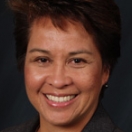
 Mary Frances Oneha is being honored as a Champion of Change for her efforts as an AAPI Women leader.
Mary Frances Oneha is being honored as a Champion of Change for her efforts as an AAPI Women leader.
I come from a place where every rock, mountain, tree, and valley has a name and is living, where “place” is seen as a refuge or sanctuary for spiritual renewal or regaining cultural rituals, where issues of health are inseparable from issues of land and water. I come from a peoples born from the union of Papa, Earth Mother and Wākea, Sky Father, who understand “place” as an extended member of the family, whose land base derived their physical sustenance, and whose pursuit of self-determination has been unrelenting as a means of survival.
It is indeed an honor to be nominated as an AAPI Woman Champion of Change, but the honor is more aptly deserved for Native Hawaiian communities who are initiating their own changes within their environments to improve the well-being of their families and neighbors. Multiple health disparities have consumed Native Hawaiians, the indigenous peoples of the State of Hawaii, for many years due to significant historical events. We are challenged today at finding solutions which will be sustainable within communities. These solutions must address community ownership, leadership, and cultural humility.
After a decade as a nurse serving acute and critically ill children, I have spent the past 20 years committed to efforts which raise the health status of Native Hawaiians to the highest possible level from a holistic perspective. These efforts have been most evident through teaching at a university, practicing at a large community health center (Waianae Coast Comprehensive Health Center), conducting community based participatory research, and most recently, serving as Chief Executive Officer of Waimanalo Health Center on the island of Oahu, Hawaii.
I have been honored to be a part of experiences and knowledge shared by community members, of stories told by those struggling to find their place, of dreams shared by kupuna (elders), of “informed consent” being about acceptance of the researchers credibility versus agreement to participate in a research project, of initiatives creating behavior change to improve the health of an `ohana (family), of Native Hawaiian employees accepted into a nursing program, of ensuring that the way knowledge is conveyed and received remains culturally intact – the challenge is to decolonize, and of the health impact supports (person, place, or thing) have on a person. The Waimanalo Health Center is embarking on a path to integrate Native Hawaiian culture throughout its operations. This began with Board and staff support and will move to seeking community input. It has been a long journey, and at times, I have become impatient with seeking an outcome. Much of what I do demands outcomes. For any sustainable change, I must respect the journey by chronicling, listening, and observing. This is about acknowledging their truth, providing an environment for people to grow and look deeply. It is about evolving a new awareness. It is community breathing – inhaling and exhaling – slow, at times ragged and edgy that springs forth a fresh awareness, a new plateau of thought that change begins to happen.
Mary Frances Oneha is CEO of the Waimanalo Health Center in Waimanalo, Hawaii.


